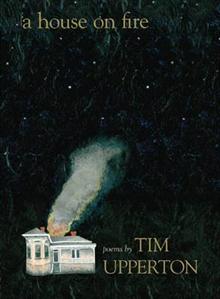The Starlings
Anger sang in that house until the scrim walls thrummed.
The clamour rang the window panes, dizzying up chimneys.
Get on, get on, the wide rooms cried, until it seemed our unease
as we passed on the stairs or chewed our meals in dimmed
light were all an attending to that voice. And so we got on,
and to muffle that sound we gibbed and plastered, built
shelves for all our good books. What we sometimes felt
is hard to say. We replaced what we thought was rotten.
I remember the starlings, the pair that returned to that gap
above the purple hydrangeas, between weatherboard and eaves.
The same birds, we thought, not knowing how long a starling lives.
For twenty years they came and went, flit and pause and up
into that hidden place. A dry rustle at night, fidgeting, calling,
a murmuration: bird business. The vastness and splendour
of their piecemeal activity, their lives’ long labour,
we discovered at last; blinking, in the murk of the ceiling,
at that whole cavernous space filled, stuffed like a haybarn.
It was like gold, except it was more like shit and straw,
jumbled with their own young, dead, desiccated, sinew
and bone, fledgling and newborn. Starlings only learn
a little thing, made big from not knowing when to leave off:
gone past all need except need, enough never enough.
Tim Upperton
from A House on Fire, Steele Roberts, 2009
Sarah Jane Barnett:
Since I first read Tim’s poem, it’s been my favourite by an Aotearoa writer. When I was a kid living in Christchurch, a hive of bees lodged themselves in our bathroom’s exterior wall. We could see them go in and out through a tiny hole in the stucco concrete. They’d land, pause for a moment on the hole’s lip, and disappear into the hollow. Eventually my parents had them fumigated.
There is so much to admire in Tim’s poem – the vibrating yet unpretentious language; the gentle comparison he creates between the labour of the family who ‘gibbed and plastered’ and the labour of the starlings’ ‘bird business’; his use of the collective noun, ‘murmuration’. I recommend listening to Tim read the poem to really see how good it is.
For me, the emotion of the poem comes from the family trying to ‘muffle’ the starlings. It makes me think about growing up in a house where ‘anger sang’ but was never acknowledged, and the way a child will push their fear and feelings down by concentrating on something else: starlings for example, or bees.
Sarah Jane Barnett is a freelance writer and editor. Her poetry, essays, interviews and reviews have been published in numerous journals and anthologies in Aotearoa and internationally. She has two poetry collections: A Man Runs into a Woman (finalist in the 2013 New Zealand Post Book Awards) and WORK (2015). Her poems often inhabit the lives of others, and ask how we find connection and intimacy when affected by trauma. Her essays explore the multifaceted theme of modern womanhood. Find out more here.
Tim Upperton’s second poetry collection, The Night We Ate The Baby, was an Ockham New Zealand Book Awards finalist in 2016. He won the Caselberg International Poetry Competition in 2012 and again in 2013. His poems have been published widely in New Zealand and overseas, and are anthologised in The Best of Best New Zealand Poems (2011), Villanelles (2012), Essential New Zealand Poems (2014), Obsession: Sestinas in the Twenty-First Century (2014), and Bonsai (2018).


Thanks so much – that’s beautiful
LikeLike
it is indeed – he is cracking good poet
LikeLiked by 1 person